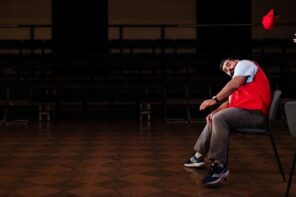“These crosses all over my body remind me of who I used to be,” sings Ethel Cain in the introduction to her album Preacher’s Daughter, capturing the southern gothic ambiance and setting the tone for the musical project. Released in May of 2022, the concept album tells the fictional story of the imagined persona of Ethel Cain, the adopted name of singer-songwriter Hayden Silas Anhedönia. The album begins by exploring themes of religion, American patriotism and conservatism, while the last few songs slip into darker subjects. The second part of the album ends with Ethel’s murder and cannibalization at the hands of her lover. In a year of remarkable releases in the indie subgenre, Cain stands out with delightfully dark subject matter, praiseworthy vocals, and poetic lyrics.
The collection of thirteen songs sustains a rather slow and mournful tone, with the exception of “American Teenager,” an upbeat tune that more closely resembles modern pop. The song is deceitfully cheerful, however, hiding cynical lyrics about American patriotism, with lines such as:
“The neighbor’s brother came home in a box
But he wanted to go so maybe it was his fault
Another red heart taken by the American dream.”
Ethel plays with her audience’s expectations of blind American optimism, forcing us to consider the truly saddening conditions of the accepted lifestyle as she witnesses the loss of members of her community to useless wars. Her crafty lyrics were even able to fool the former president of the United States, Barack Obama, who included the song in his yearly recap of his favorite music. The singer tweeted back, pointing out the irony by stating, “Did not have a former president including my anti-war, anti-patriotism fake pop song on his year end list on my 2022 bingo.”
In a year of remarkable releases in the indie subgenre, Cain stands out with delightfully dark subject matter, praiseworthy vocals, and poetic lyrics.
The third song on the album, a ballad called “A House in Nebraska,” finds Ethel reminiscing about an old flame with whom she once imagined a future. The song is what first drew me to the album, and to Ethel Cain’s music. I loved the deliberate slowness of the music, juxtaposed with the strong vocals and the emotional lyrics. Cain recently released a live performance for Vevo’s Artists to Watch, showcasing her raw talent and ability to govern the room with a sense of gloom. While the anecdote told in this song doesn’t add much to Ethel’s fictional storyline, it helps characterize her and her position, establishing a feeling of solitude that reappears throughout the album. It helps us understand her motivations in the next songs, as she runs away from home in search of more freedom.
The song “Thoroughfare,” which lasts nearly ten minutes, finds Ethel “On the side of the road in some torn up clothes,” after having escaped her family home. She is picked up by a man traveling across the country, with whom she becomes romantically involved. This lover appeals to her because of his apparent softness, as Ethel says:
“But in these motel rooms, I started to see you differently, oh
Cause for the first time since I was a child, I could see a man who wasn’t angry.”
However, after further considerations, we see that he may not be as ideal as she pictures him. She ran away from the suffocating environment of her hometown, exhausted by the false beliefs of American patriots, yet this new love interest embodies those same values:
“You fell in love with America when you were 12 years old
And by 17, you knew you had to see it all.”
Through no coincidence, Cain adopts a modern country aesthetic for this song, reminiscent of artists such as Kacey Musgraves. This typical American style, though idealized, may point to Ethel’s apparent freedom being an illusion of her own making. She finds herself, once again, under the authority of someone who encroaches on her autonomy.
The following songs unabashedly delve into the darker aspects of Ethel Cain’s life story. “Ptolemaea” is especially impressive, as it exemplifies how music can express horror just as well as visual art. The title of the song calls to the circle of Hell where traitors lie, as described in Dante’s Inferno. The voice of the lover from “Thoroughfare,” having been revealed as an abusive man, exchanges with a tortured Ethel, as he chants terrifying cult-like incantations. Ethel begs him to show her pity, and the music picks up, releasing a catharsis of screams, drums and guitar. This track is particularly compelling, and it is paramount to setting the tone of the remainder of this album.
Amidst an array of impactful indie records released in the last year, Ethel Cain made her mark with an innovative sound inspired by her own twisted imagination.
After two entirely instrumental songs, Cain presents “Sun Bleached Files,” a reflection on seeking comfort and being disappointed in that quest. Still under her abuser’s grasp, Ethel thinks back to her life before they had met, surprisingly missing her religious upbringing. Heartbreakingly, she sings, “What I wouldn’t give to be in church this Sunday,” yearning for a time when she wasn’t in this precarious situation. She immediately realizes the flaw in this wish, admitting that there is no salvation in religion:
“‘God loves you, but not enough to save you’
So, baby girl, good luck taking care of yourself.”
She frequently repeats how she means to fight for herself, but there’s an understanding that her life is no longer her own at this point. How ironic it is that Ethel has just now found the strength to stand up for herself, though she cannot. Later, the song turns into more of a meditation on her life, as she “[forgives] it all as it comes back,” giving herself up to a predeterministic philosophy. The end of “Sun Bleached Files” references a previous song in the album: “And I’m still praying for that house in Nebraska.” She shifts from her religious praying, seeking solace but being disappointed yet again, to reminiscing about the imagined future she had created for herself. This second strategy seems to soothe Ethel more than her unanswered prayers, showing how the comfort of memories and made-up realities are more powerful than surrendering to God’s will. While this song is less abrasive than some of the others in the album, there is still a sense of anger expressed against God and Christianity.
Cain closes Preacher’s Daughter with “Strangers”, which is certainly not for the faint of heart. Though the melody itself doesn’t call to horror like “Ptolemaea” does, the lyrics themselves are unmistakably about Ethel being cannibalized by her abuser. She sings posthumously, exposing the dehumanizing horrors her corpse is subjected to:
“If I’m turning in your stomach
Am I making you feel sick?”
The song could easily be mistaken for a love song, which Cain uses in her favor, playing with words to twist their meaning: “You’re so handsome when I’m all over your mouth.” What’s most striking to me is Ethel’s address to her mother, a soft adieu in the song’s outro asking her not to linger in her grief:
“Mama, just know that I love you,
And I’ll see you when you get here.”
These words close out the album, leaving fans in an ambivalent state of distress mixed with tenderness. Having listened to the album in its intended order, “Strangers” made me stop in my tracks, both horrified at the fate of this persona I had grown attached to and in awe at the artistry of Preacher’s Daughter.
***
Amidst an array of impactful indie records released in the last year, Ethel Cain made her mark with an innovative sound inspired by her own twisted imagination. Having gathered the attention of thousands of new listeners, myself included, Cain stands as a figure to watch in the music industry. Fans of Phoebe Bridgers or Fiona Apple, and anyone fixated on religious imagery or the demystification of the American dream, be sure to listen to Preacher’s Daughter.








